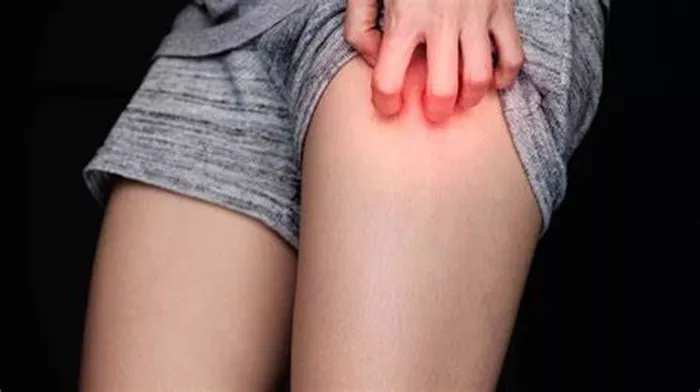Experiencing an itchy rash on the thighs can be both uncomfortable and distressing. Such rashes can arise from a variety of causes ranging from allergic reactions to infections, or even chronic skin conditions. In this comprehensive exploration, we will delve into the multiple factors that can lead to itchy rashes on the thighs, their diagnostic challenges, and the effective management strategies that can be employed to alleviate symptoms and address the underlying causes.
Anatomy of the Skin and Its Vulnerabilities
The skin, the body’s largest organ, serves as a barrier against environmental aggressors. It is composed of three primary layers: the epidermis (outer layer), dermis (middle layer), and hypodermis (deeper subcutaneous tissue). Each layer plays a role in skin health, but the epidermis is particularly crucial as it interfaces with the environment. When this barrier is compromised, whether through injury, irritation, or infection, rashes can develop.
Common Causes of Itchy Rash on Thighs
Itchy rashes on the thighs can stem from several different sources. Identifying the correct cause is key to effective treatment. Here we discuss the most common factors:
Allergic Reactions
Contact Dermatitis: This occurs when the skin comes into contact with an allergen or irritant, leading to a localized rash. Common irritants include laundry detergents, body care products, and materials in clothing like latex or dyes.
Urticaria (Hives): Caused by an allergic reaction to food, medications, or other triggers, urticaria presents as raised, itchy welts on the skin, including the thighs.
Infections
Fungal Infections: The warm, moist environment around the thighs makes it a prime area for fungal growth. Tinea cruris, also known as jock itch, is a common fungal infection in this area that causes a red, itchy, and often ring-shaped rash.
Bacterial Infections: Impetigo, folliculitis, and cellulitis are examples of bacterial infections that can cause rashes on the thighs. These infections require prompt medical treatment to prevent spread and complications.
Viral Infections: Certain viral infections, such as herpes simplex and zoster, can manifest with painful, itchy rashes on the thighs and other parts of the body.
Environmental Factors
Heat Rash: Also known as miliaria, heat rash develops when sweat ducts become blocked and inflamed due to excessive heat and humidity, leading to a prickly, itchy sensation on the skin.
Insect Bites and Stings: Bites from mosquitoes, fleas, bed bugs, or other insects can cause localized itching and rash.
Chronic Skin Conditions
Psoriasis: A chronic autoimmune condition that results in the buildup of skin cells. Psoriasis leads to patches of thick, red skin and silvery scales that can be itchy and sometimes painful.
Eczema (Atopic Dermatitis): Eczema is characterized by dry, itchy, red skin. It frequently occurs on the inner thighs and behind the knees.
Autoimmune Disorders: Conditions like lupus can manifest skin symptoms, including rashes on various parts of the body, including the thighs.
Chafing: Repeated skin friction, often caused by tight clothing or during physical activities like cycling or running, can lead to chafing. This results in a rash that can be painful and itchy.
Hormonal and Systemic Causes
Hormonal Changes: Fluctuations in hormones, such as those during pregnancy or menopause, can lead to changes in skin condition, including the development of rashes.
Diabetes: Patients with diabetes are more prone to skin infections and conditions that may lead to rashes.
Diagnosis of Thigh Rashes: A Step-by-Step Approach
Diagnosing the cause of a thigh rash involves several steps, typically starting with a thorough medical history and physical examination. Healthcare providers may ask about recent exposures to allergens, history of similar symptoms, personal and family medical history, and any new products or medications used. In some cases, diagnostic tests such as skin swabs, scrapings, or allergy testing may be necessary to pinpoint the exact cause.
Effective Treatments and Management Strategies
Treatment for itchy thigh rashes varies depending on the underlying cause:
Antifungals: Topical or oral antifungal medications for fungal infections like jock itch.
Antibiotics: Required for bacterial infections to prevent spread and reduce complications.
Corticosteroids: Creams or ointments to reduce inflammation and itchiness for conditions like eczema and psoriasis.
Antihistamines: To alleviate itching caused by allergic reactions or urticaria.
Moisturizers and Emollients: Essential for managing dry, itchy skin associated with eczema and other dry skin conditions.
Lifestyle and Home Remedies: Keeping the affected area clean and dry, wearing loose-fitting clothing, and using hypoallergenic products can also help manage symptoms.
Preventive Measures to Avoid Future Rashes
Preventing thigh rashes involves a combination of good skincare practices and lifestyle adjustments:
Personal Hygiene: Regular washing with a gentle cleanser, avoiding harsh soaps.
Appropriate Clothing: Opting for breathable, moisture-wicking fabrics, especially during exercise.
Environmental Control: Using air conditioning or fans to reduce sweating in hot weather.
Skin Care Products: Choosing products labeled “for sensitive skin” or “hypoallergenic” to minimize the risk of allergic reactions.
Conclusion: Empowering Through Knowledge and Care
Understanding the causes and management of itchy rashes on the thighs is crucial for effective treatment and prevention. By recognizing early signs and seeking appropriate care, individuals can significantly improve their quality of life. As awareness grows, so does the ability to handle these uncomfortable and often distressing symptoms with confidence and efficacy. Whether dealing with a temporary irritation or a chronic condition, informed decisions about treatment and preventive care can lead to better skin health and overall well-being.
[inline_related_posts title=”You Might Be Interested In” title_align=”left” style=”list” number=”6″ align=”none” ids=”8538,8471,8468″ by=”categories” orderby=”rand” order=”DESC” hide_thumb=”no” thumb_right=”no” views=”no” date=”yes” grid_columns=”2″ post_type=”” tax=””]































